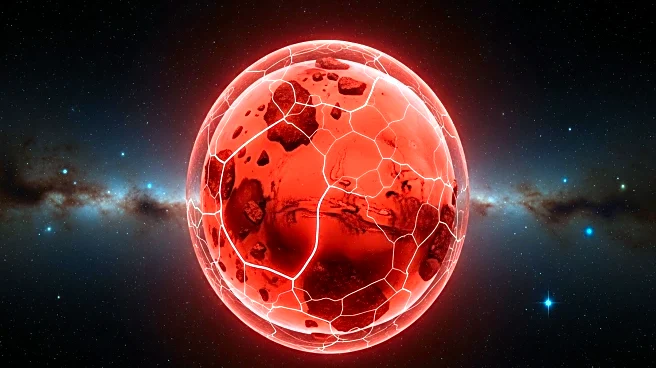What is the story about?
What's Happening?
Recent research published in the journal Science has uncovered that Mars' mantle contains ancient geological fragments, preserved from the planet's violent early history. The study, led by Dr. Constantinos Charalambous from Imperial College London, utilized seismic data from NASA's InSight mission to reveal that Mars' interior is not smooth and uniform, but rather contains chunks of material up to 4 kilometers wide. These fragments are believed to be remnants from colossal impacts that occurred during Mars' formation about 4.5 billion years ago. These impacts melted large parts of the young planet into magma oceans, which, upon cooling, crystallized into distinct chunks. Unlike Earth, Mars' stagnant outer crust has preserved these features, offering a glimpse into the planet's early chaotic state.
Why It's Important?
This discovery is significant as it provides insights into the formation and evolution of rocky planets, including Earth. Mars' preserved interior acts as a geological time capsule, allowing scientists to study the aftermath of early planetary collisions. Understanding Mars' mantle composition can shed light on the processes that shaped other rocky planets like Venus and Mercury. The findings challenge previous assumptions about planetary interiors and highlight the differences between Mars and Earth, where tectonic activity continuously recycles the crust and mantle. This research could influence future planetary exploration and the search for ancient life on Mars.
What's Next?
The study opens avenues for further exploration of Mars' interior and its geological history. Scientists may continue to analyze seismic data from past missions to uncover more details about Mars' mantle and its preserved features. Future missions could focus on drilling into Mars' surface to directly study these ancient fragments. Additionally, the findings may prompt comparative studies of other rocky planets to understand their evolutionary paths. The implications for planetary science are vast, potentially influencing theories about the formation of the solar system and the conditions necessary for life.
Beyond the Headlines
The research highlights the importance of preserving planetary interiors for understanding their history. Mars' stagnant crust has kept its mantle largely unchanged, offering a unique opportunity to study early planetary conditions. This preservation contrasts with Earth's dynamic tectonic activity, which continuously alters its interior. The study also raises questions about the potential for similar preservation on other planets and moons, which could provide further insights into the solar system's history. The ethical considerations of planetary exploration and the preservation of these geological time capsules are also worth exploring.















